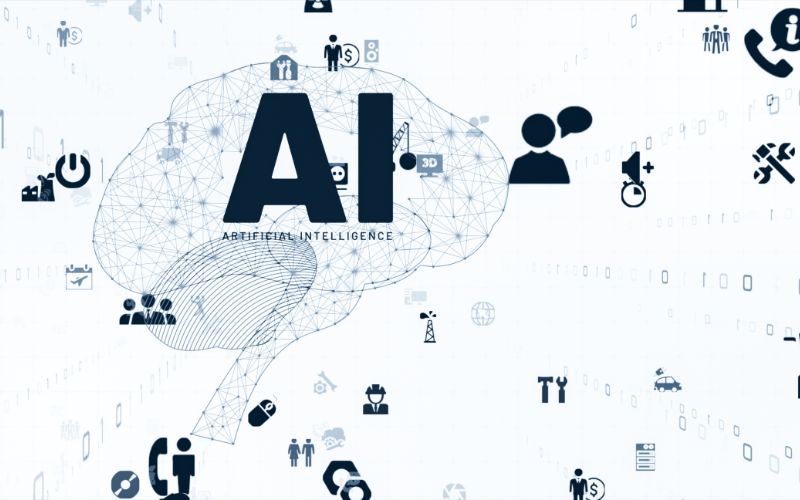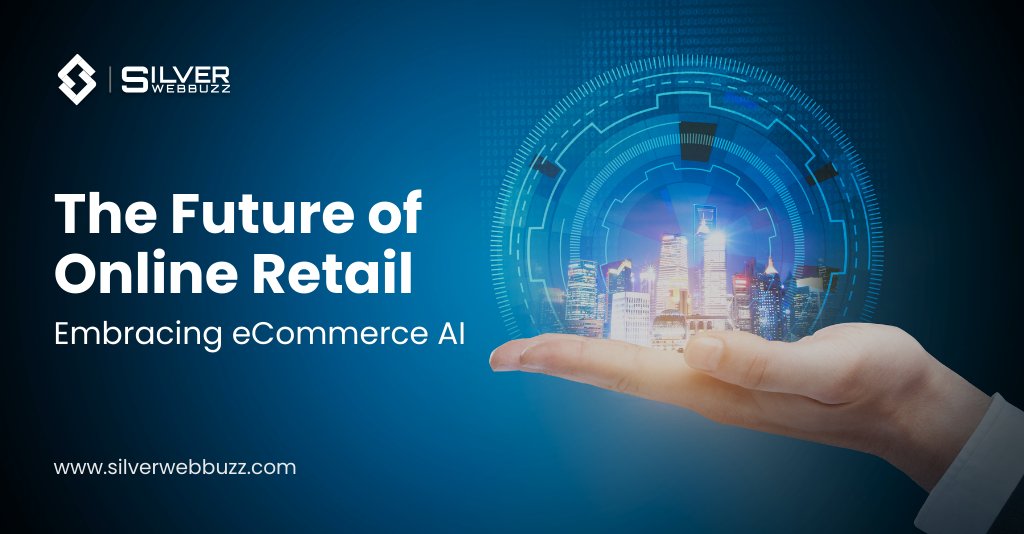The rapid evolution of technology continues to reshape how businesses operate—and one of the most transformative forces in online retail today is ecommerce AI. As consumer expectations grow, traditional eCommerce platforms face immense pressure to provide faster, smarter, and more personalized experiences. Enter artificial intelligence (AI), a revolutionary technology that is making online stores more efficient, customer-focused, and competitive.
From personalized shopping experiences to smarter logistics, AI in eCommerce is enhancing every stage of the buyer journey. Whether you are a startup or an established enterprise, investing in AI is no longer a luxury—it’s a necessity. This article will explore the power of ecommerce AI, how it’s driving transformation across industries, and how companies like Silver WebBuzz are helping businesses integrate AI-driven solutions through e-Commerce Development Services.
Overview of Artificial Intelligence (AI)

Artificial Intelligence is a branch of computer science aimed at building machines capable of performing tasks that require human intelligence. These tasks include learning, problem-solving, understanding language, and recognizing patterns. In the context of eCommerce, ecommerce AI is used to mimic human decision-making, automate operations, and deliver real-time insights.
Key components of AI include:
- Machine Learning (ML): Algorithms that allow systems to learn from data and improve over time.
- Natural Language Processing (NLP): Enables machines to understand, interpret, and generate human language.
- Computer Vision: Allows computers to interpret visual data such as images and videos.
- Deep Learning: A more advanced subset of machine learning that uses neural networks to simulate human thought processes.
Together, these technologies power ecommerce AI, enabling smarter search engines, intelligent product recommendations, AI chatbots for ecommerce, and so much more.
Importance of AI in Transforming the eCommerce Landscape
In today’s digital-first economy, consumers expect personalized, seamless, and instant online experiences. Whether they are browsing for clothes, electronics, or daily essentials, shoppers demand intuitive platforms that understand their preferences and respond proactively. This is where e-commerce Artificial Intelligence proves to be a game-changer. By harnessing the power of artificial intelligence, businesses can meet—and often exceed—modern consumer expectations.
Enhanced Customer Experience
One of the most impactful advantages of AI in eCommerce is its ability to deliver highly personalized customer experiences. Through intelligent data analysis and predictive modeling, AI can anticipate user needs and provide tailored product recommendations, dynamic website content, and personalized emails. These features improve customer satisfaction, increase loyalty, and boost overall conversion rates.
Operational Efficiency
AI helps automate repetitive tasks such as inventory forecasting, supply chain logistics, dynamic pricing, and order processing. By minimizing human error and reducing operational workloads, ecommerce AI enables faster decision-making and significant cost savings. Businesses using AI can reallocate human resources to more strategic roles, driving overall growth.
Marketing and Customer Engagement
AI transforms marketing by enabling hyper-targeted campaigns. With ecommerce AI, businesses can segment audiences, generate tailored ad content, and optimize email marketing strategies. Integration of AI-driven tools through a robust e-Commerce Development Service ensures smarter engagement and improved return on investment.
Risk Management
AI plays a crucial role in fraud detection, cybersecurity, and compliance. From analyzing transactional anomalies to monitoring unauthorized activities, ecommerce AI enhances business security. The use of AI in eCommerce ensures a safer and more reliable shopping environment, reinforcing customer trust.
By strategically leveraging ecommerce AI, businesses can revolutionize their operations and create memorable, secure, and efficient digital experiences.
What is eCommerce AI?

Definition and Explanation of AI in the Context of eCommerce
eCommerce AI refers to the integration of artificial intelligence technologies into online retail platforms to automate processes, enhance customer interactions, and optimize business performance. It’s a blend of software tools and intelligent algorithms designed to mimic human cognitive functions.
Whether it’s recommending a product based on previous purchases, analyzing customer feedback, or streamlining warehouse operations, AI in eCommerce has become an essential part of digital transformation strategies.
Key Technologies Powering eCommerce AI (Expanded)
The true potential of ecommerce AI lies in the technologies that power it. These technologies work together to enhance online shopping experiences, automate back-end processes, and help businesses understand consumer behavior in real time. Let’s take a deeper look at the core innovations driving AI in eCommerce.
Machine Learning (ML)
Machine learning algorithms are the backbone of ecommerce AI. These systems analyze vast volumes of customer data—including browsing history, purchase behavior, and demographic information—to uncover patterns and predict future actions. With this insight, businesses can tailor marketing efforts, personalize recommendations, and even forecast trends. ML not only increases conversion rates but also enhances customer satisfaction by making shopping more intuitive.
Natural Language Processing (NLP)
AI chatbots for ecommerce rely heavily on NLP to simulate human-like conversations. NLP enables chatbots to interpret user queries, understand intent, and provide accurate, real-time responses. Whether it’s answering product questions, resolving complaints, or offering recommendations, NLP ensures that customer service is available 24/7—without human intervention. It’s a core component of any modern e-Commerce Development Service that aims to provide scalable and cost-effective customer support.
Computer Vision
Computer vision allows platforms to “see” and interpret visual inputs. One of the most exciting applications in AI in eCommerce is visual search, where customers can upload an image of a product they like, and the AI returns similar or exact matches. This not only enhances user engagement but also bridges the gap between inspiration and purchase, making the shopping process faster and more visual.
Recommendation Engines
Powered by ecommerce AI, recommendation engines analyze customer behavior through collaborative filtering and content-based filtering. These engines suggest products that align with a shopper’s preferences, increasing average order value and reducing cart abandonment rates. It’s a fundamental feature in any AI-enabled e-Commerce Development Service, ensuring personalized shopping experiences.
Voice Search Integration
As smart speakers and voice assistants become more prevalent, AI in eCommerce has adapted to include voice-based interactions. AI interprets spoken commands, enabling users to search for products, check order statuses, or even place orders via voice. This hands-free functionality adds convenience and accessibility, especially for mobile and smart-home users.
By leveraging these powerful technologies, businesses can build intelligent, responsive, and highly personalized shopping platforms. Integrating ecommerce Artificial Intelligence through solutions like those offered by Silver WebBuzz ensures a competitive edge in today’s fast-paced digital marketplace.
How to Build Effective and Trustworthy AI Systems in eCommerce

Strategies for Integrating AI Responsibly
Integrating AI in eCommerce requires thoughtful planning. Here are key strategies:
- Start Small: Begin with AI-powered features like chatbots or recommendation engines.
- Use Quality Data: Ensure AI models are trained on accurate, relevant data to produce reliable results.
- Leverage Proven Platforms: Work with experienced providers like Silver WebBuzz, which offers reliable e-Commerce Development Services tailored to AI integration.
Ensuring Transparency, Data Privacy, and Ethical Usage
As powerful as AI is, it’s essential to use it ethically:
- Transparency: Inform customers when AI is being used and explain how it impacts their experience.
- Data Privacy: Use data responsibly and ensure compliance with GDPR and other regulations.
- Bias Mitigation: Regularly audit AI systems to detect and eliminate bias in decision-making processes.
Building Customer Trust with AI-Driven Features
Customers are more likely to engage with ecommerce AI when they trust it:
- Offer clear opt-in options for personalized experiences.
- Allow users to control data sharing preferences.
- Provide human fallback options in AI-driven chat systems.
Creating transparent and secure AI systems ensures long-term success and customer loyalty in the world of AI in eCommerce.
Current and Future Use Cases of AI in eCommerce (Expanded)

The integration of ecommerce in AI has revolutionized how businesses interact with customers, manage operations, and stay competitive in an ever-evolving digital landscape. From enhancing customer experience to optimizing backend logistics, AI in ecommerce is powering innovation across the entire retail value chain.
Personalized Product Recommendations
One of the most visible and impactful applications of ecommerce Artificial Intelligence is its ability to deliver hyper-personalized product recommendations. AI analyzes a vast array of data points—browsing behavior, previous purchases, demographic details, and even time spent on product pages—to predict what a customer might want next. These real-time, tailored suggestions not only improve the shopping experience but also significantly increase average order values and conversion rates.
Intelligent Search and Visual Search
Traditional keyword-based search has its limitations, but AI in ecommerce upgrades this function through intelligent search powered by semantic understanding and machine learning. Meanwhile, computer vision enables visual search, where users upload an image to find similar products. This functionality, especially useful in fashion and home decor, creates a frictionless and intuitive shopping journey.
AI-Powered Chatbots and Virtual Shopping Assistants
AI chatbots for ecommerce are redefining customer service. These intelligent systems operate 24/7, answering frequently asked questions, assisting with product inquiries, tracking orders, and even processing returns. This reduces human workload, speeds up response times, and improves overall customer satisfaction.
Predictive Analytics for Demand Forecasting
Predictive analytics is a key advantage of e-commerce Artificial Intelligence. By examining historical data, seasonal trends, and consumer behavior, AI can forecast demand with high accuracy. This helps businesses avoid stockouts or overstocking, ensuring inventory levels align with real-time demand.
Dynamic Pricing and Inventory Optimization
AI algorithms dynamically adjust product prices based on a variety of factors including market trends, competitor pricing, and consumer behavior. This real-time pricing ensures maximum profitability while staying competitive. Additionally, AI helps optimize inventory by forecasting replenishment needs and automating stock orders.
Fraud Detection and Cybersecurity
AI plays a crucial role in detecting fraudulent activities by analyzing transaction patterns, identifying anomalies, and flagging suspicious behavior in real time. This enhances trust and security, protecting both businesses and consumers from potential financial losses.
AI in Logistics and Supply Chain Management
Efficient logistics are vital for eCommerce success, and ecommerce AI offers tremendous support here. AI optimizes delivery routes, predicts shipping delays, and automates warehouse operations like reordering and restocking. This leads to faster delivery, reduced costs, and improved customer satisfaction.
As AI technology continues to evolve, these use cases will only expand, bringing even more intelligent, predictive, and automated solutions to the forefront. Companies that adopt AI in ecommerce today—especially through reliable e-Commerce Development Services—will be best positioned to lead the market tomorrow. With expert AI integration partners like Silver WebBuzz, businesses can turn these advanced use cases into real-world results and long-term growth.
AI for Personalized Shopping Experiences
Precision Targeting and Customer Segmentation
AI segments users based on behavior, demographics, and interests, allowing businesses to deliver targeted promotions and content.
- Deliver promotions at optimal times
- Show dynamic landing pages for different user segments
- Create user-specific experiences
Real-Time Personalization Using AI Algorithms
ecommerce AI enables real-time personalization, such as:
- Displaying trending products for first-time visitors
- Recommending restocks for returning customers
- Adjusting homepages based on user intent
Silver WebBuzz has helped numerous clients develop such personalized features through their e-Commerce Development Services, leveraging ecommerce Artificial Intelligence to drive user engagement and loyalty.
AI in Marketing and Customer Engagement

AI-Driven Email Campaigns and Product Suggestions
AI can tailor email content to individual users, suggest personalized products, and predict the best time to send promotional messages.
Sentiment Analysis and Customer Feedback Management
AI tools can analyze reviews, social media, and feedback to gauge customer sentiment. This allows businesses to:
- Respond quickly to negative reviews
- Improve products based on real-time feedback
- Enhance customer service strategies
By incorporating e-commerce Artificial Intelligence, businesses can improve how they connect with their audience, ensuring every communication is impactful and relevant.
Challenges in Implementing AI in eCommerce

Data Quality and Integration Issues
AI systems depend on clean, structured, and comprehensive data. Poor data leads to inaccurate outputs and subpar performance.
High Cost and Complexity of AI Implementation
Deploying ecommerce AI solutions can be costly and technically challenging. Businesses often require:
- Custom development
- Infrastructure upgrades
- Ongoing model training
However, cost-effective implementation is possible by partnering with experts like Silver WebBuzz, a leader in e-Commerce Development Services.
Customer Concerns Around Data Use and Privacy
With growing awareness about digital privacy, consumers are cautious about how their data is used. To mitigate these concerns:
Be transparent
- Offer privacy controls
- Ensure secure data handling
Need for Skilled Talent and Continuous Model Training
AI models need regular updates and human oversight. Hiring and retaining talent for AI can be difficult, especially for small to mid-sized enterprises.
Despite these challenges, the benefits of AI in eCommerce far outweigh the hurdles, especially when guided by experienced tech partners.
Conclusion and Key Recommendations
eCommerce Artificial Intelligence has emerged as a transformative force in the digital retail landscape, revolutionizing how businesses engage with customers and optimize operations. From delivering personalized product recommendations to managing inventory automatically and providing intelligent customer support through AI chatbots for ecommerce, AI has become a cornerstone of modern e-Commerce Development Services. As this technology continues to evolve, it promises to reshape the future of online shopping by enabling smarter, faster, and more predictive business strategies. For eCommerce companies, embracing AI in ecommerce is not just an option—it’s a necessity to remain competitive and innovative in a customer-centric world.
To ensure successful AI adoption, businesses should begin with clear objectives and scalable pilot projects, laying a strong foundation for growth. It’s essential to maintain data integrity and implement robust data governance policies to support AI performance. Collaborating with experienced AI partners such as Silver WebBuzz can streamline implementation and ensure that solutions are tailored to unique business needs. Additionally, continuous monitoring and regular updates to AI models help maintain accuracy and relevance. As competition in the digital marketplace intensifies, those who strategically invest in ecommerce AI will lead the charge into a smarter, more personalized, and interconnected future.




